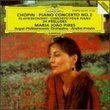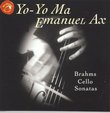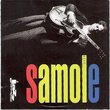| All Artists: Ludwig van Beethoven, Mitsuko Uchida Title: "Beethoven: Piano Sonatas Opp. 109, 110 & 111" Members Wishing: 0 Total Copies: 0 Label: Philips Original Release Date: 1/1/2006 Re-Release Date: 4/25/2006 Genre: Classical Styles: Chamber Music, Forms & Genres, Sonatas, Historical Periods, Classical (c.1770-1830), Romantic (c.1820-1910) Number of Discs: 1 SwapaCD Credits: 1 UPC: 028947569350 |
Search - Ludwig van Beethoven, Mitsuko Uchida :: "Beethoven: Piano Sonatas Opp. 109, 110 & 111"
 | Ludwig van Beethoven, Mitsuko Uchida "Beethoven: Piano Sonatas Opp. 109, 110 & 111" Genre: Classical
Beethoven?s last three piano sonatas have long been regarded as the Mt. Everest of the form, heights that can be scaled only by pianists who possess the keyboard technique to realize the depth of the composer?s vision. By ... more » |
Larger Image |
CD DetailsSynopsis
Amazon.com Beethoven?s last three piano sonatas have long been regarded as the Mt. Everest of the form, heights that can be scaled only by pianists who possess the keyboard technique to realize the depth of the composer?s vision. By those standards, if Uchida isn?t the equal of such giants as Arrau, Kempff, and Schnabel, she certainly comes close enough to make this an outstanding release. Her pianissimos are feathery-light; her fortes are as powerful as one might wish, and her trills are analogues of Beethoven?s spiritual ideas. She renders Beethoven?s full dynamic palette with nuances that make every shading register. Uchida never makes an ugly sound. Her tone remains warm, colorful, and full-bodied. More important, her interpretation encompasses the inward, contemplative slow sections as well as the energetic ones, and she plays Beethoven?s contrapuntal passages with a clarity that makes every musical strand count. She?s helped by outstanding engineering, too. Not all of the transcendental Beethoven is captured here, but Uchida comes a lot closer than most pianists can aspire to. That alone makes this disc a must-have. -- Dan Davis Similarly Requested CDs
|
CD ReviewsSUPERLATIVE LATE-BEETHOVEN PLAYING Klingsor Tristan | Suffolk | 04/26/2006 (5 out of 5 stars) "This is not only piano playing but also musical thinking of a very high order. In her fascinating notes that accompany this disc, Uchida is at pains to emphasise the connections and interrelationships between Beethoven's last three piano sonatas. Certainly the impact to be had from playing all three sonatas at a sitting is cumulative, growingly intense and finally overwhelming. Make no mistake. These are great performances of these ground-breaking pieces. They achieve a perfect balance of intellectual rigour (in the voicing of fugal and contrapuntal passages, for example, or in the elucidation of Beethoven's fascination with and elaboration of variation form in his late period) with passion and emotion. To take just the first movement of Op.109, at the start Uchida manages to capture the feeling that this is music caught, as it were, in media res, that it was going on before the sonata begins and that it just emerges from the silence. The opening theme is delivered with ideal simplicity, but Beethoven's stark elisions of sonata form mean we are carried alarmingly quickly into startling harmonic territory: Uchida disguises nothing in the arpeggios that drag us from key to key, before the sunlight emerges with clarity in the second subject. Within just a couple of minutes, we have been through a daring development section, a modified recapitulation and an extended coda that restores us to the simplicity of the opening. Uchida makes this frighteningly concentrated thought absolutely cogent and clear. The variation movement that ends Op.109 lasts twice as long as the other two movements together and covers a vast emotional range. Uchida has the measure equally of the seemingly na?ve melodic simplicity of the theme and the changing tempos, moods, dynamics and rhythmic complexities that Beethoven subjects it to. In Op.110, it is again the stark contrasts inherent in the material that Uchida brings out. The lyricism of the opening movement against the disturbing rhythmic lurches of the second: the sad (dolente) lament of the Arioso introduction to the fierce grandeur of the fugue which follows it and to which the whole sonata seems to have been aiming. Note also the intense darkness with which Uchida invests the chords that lead from the reprise of this Arioso into the return of the fugue. Op.111, in these performances, is the towering pinnacle not only of this disc but of the whole cycle of Beethoven piano sonatas. There is immense power in Uchida's performance of the opening movement. She never shies away from the expressionist leaps and harsh dissonances implicit in much of the dark C Minor writing. But it is the final set of variations that crowns it all. Another deceptively simple theme, played here with intense quietude, leads into an even greater range of variations than those in Op.109. Uchida guides us unerringly through the increasing rhythmic complexity of the early variations, back through the theme decorated with what she rightly calls 'celestial arabesques' into areas of severe darkness and brilliant light with all those wild and wonderful extended trills that so fascinated late Beethoven and finally to a sublimely ethereal calm at the end. This is a superlative performance of this many facetted movement. The piano sound on this CD is a delight as well. Recorded at the Snape Maltings, this is decidedly not one of those in-yer-face, brilliantly lit, clattery piano sounds. There is the feeling of a real hall ambience here, with the space for the sound to breathe and grow before it reaches the microphones and our ears. This doesn't imply any compromises in dynamic range or tonal colour; simply an ideal, best seat-in-the-house naturalness. Need I say more? A real winner. " Among the Best Recordings of Beethoven's Last Three Piano So John Kwok | New York, NY USA | 05/14/2006 (5 out of 5 stars) "I wish Mitsuko Uchida hadn't waited so long to start recording Beethoven's piano sonatas, having already demonstrated her keen interest in and superlative playing of Mozart's and Schubert's major works for the piano. This is quite simply her best recording of Beethoven's piano scores I have yet heard, coupled with some elegant, often profound, musicological notes on these scores which she has written in the liner notes to this CD. I am especially impressed with her thoughtful, yet expressive, performances of both the Opus 109 and 111 piano sonatas; these rank alongside recordings I have heard from both Alfred Brendel and Maurizio Pollini as among the finest I've come across. The recordings also successfully capture the warm ambience of the Snape Maltings, England concert hall, enhancing the vibrant qualities of her performances. In the liner notes Uchida observes how Beethoven employed motifs from Opus 109 as though they were germinating seeds of passages which he would elaborate further in the Opus 110 and 111 sonatas. She also does this in her playing of these works, offering quite nuanced, at times, understated performances, most notably in the second movement of Opus 111, which she notes in the liner notes as sounding almost like jazz or boogie-woogie. Hopefully this splendid CD is the first of a long-awaited Beethoven piano sonata cycle; without question, it is an excellent beginning for both Philips and Mitsuko Uchida." Uchida - unparalleled C. Thomas | 01/07/2007 (5 out of 5 stars) "It has been clear to me for some time now that I listen to other aspects of musical renditions than most classical fans. Sure, the obvious aspects are important (hitting all the notes as it were) but this is merely the baseline. The extreme difficulty I experienced in finding an acceptable rendition of Bach's 48, for example, contrasted with the glowing reviews of many renditions which I own and have rejected as being unacceptably inaccurate.
Similarly, I had great difficulty finding a rendition of Beethoven's sonatas which made musical and rhythmical sense. Reading through the other reviews of this recording, several reviewers mentioned recordings I have - and cannot listen to. Although I only have two complete recordings of the sonatas, I have several other recordings of sonatas by a number of highly respected artists. I will not mention names here, as I feel that the mere fact that an artists has - in my opinion - failed to render a given piece acceptably, does not necessarily diminish the stature of the artist. Rather, I would dwell on the rendition by Uchida. I have found with many recordings by Uchida (I have a fair collection) that her interpretation often seems to capture what I wanted to hear in the composition. This is certainly true of her recordings of Mozart and Schubert, amongst others. Here, as well, listening to the recording by Uchida (and, it should be mentioned, the recording is exceedingly fine in the technical domain as well) she not only captures the spirit of the compositions, but manages to find a timing - a rhythm - which, for me, is the first which resolves the many problems exhibited by these pieces. The timing of the Beethoven pieces are (in my probably irrelevant opinion) really critical. For the recording to make sense - to me, at least - an incredibly narrow path must be trodden when accelerating and decelerating between the fast and slow phrases, else the necessary tenuous link with the rules of progression and completion as laid down by Bach is lost, and they become senseless sequences of notes. Of course, my opinion on this issue certainly counts for nothing, but I find comfort in the fact that Uchida seems to agree with my take on the problem. At last, in this masterly rendition, I have found a recording I can listen to. I had given up on these last three sonatas, now I can listen to them again with pleasure. I believe this is simply the finest recording of these three works ever recorded, and one of the finest piano recordings in my collection. Unparalleled." |

 Track Listings (9) - Disc #1
Track Listings (9) - Disc #1








